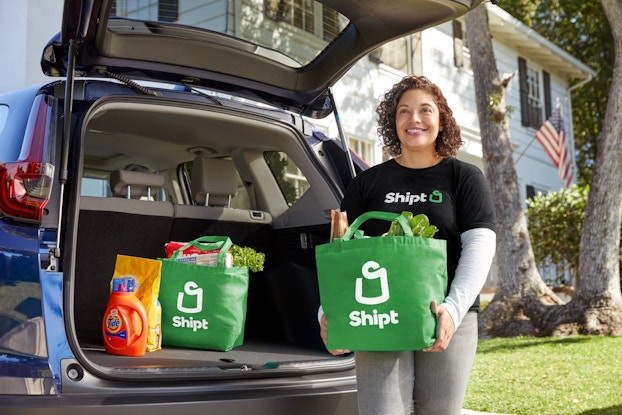
Why it matters:
- The pandemic drove a surge in online grocery shopping, doubling the number of consumers who bought food online from 2019 to 2021, according to Gallup.
- The crisis also fueled the rise of remote work, which led to people investing more in their homes, just as they sought out new ‘workation’ — work-meets-vacation — experiences amid the work-from-anywhere trend.
- Against that backdrop, home-sharing startup Pacaso, local services platform Thumbtack and delivery disruptor Shipt reaped sales and customer acquisition gains.
The pandemic-fueled rise of remote work and online grocery shopping sparked fresh growth opportunities for three startups whose very business models, serendipitously, served these synchronous trends.
But it’s by leaning into strategies that stoked consumers’ post-COVID lifestyle shifts that have yielded real estate startup Pacaso, home-management platform Thumbtack and supermarket delivery disruptor Shipt some of their biggest gains of late, executives from the trio of brands told CO—.

Interested in a small business membership?
Find out how the U.S. Chamber of Commerce can help your company grow and thrive in today's rapidly-evolving business environment. Connect with our team to learn how a small business membership can benefit your bottom line and help you achieve your goals.
Shipt, for one, partnered with Visa to fast-track the adoption of same-day delivery among credit card holders; Thumbtack tapped into the $500 billion home services industry with consumers in nesting mode; and Pacaso stoked the work-from-anywhere movement via its shared homeownership platform.
“The pandemic has significantly shaped the how, where and why of consumer spending,” according to a report by investment firm Cowen. “Digital adoption raced forward, personal values and priorities were reshaped, new habits were formed, and expectations were reset.”
People were looking to find time away from their primary home to do remote work. That’s one factor that has enabled us to grow so quickly. It was a real and actionable demand.Austin Allison, co-founder and CEO, Pacaso
Pacaso reaches unicorn status as ‘people were looking to find time away from their primary home to do remote work’
Pacaso boasts that its fractional home-buying model makes second-home ownership, a highly discretionary purchase, affordable to folks who’ve considered the proposition utterly out of reach.
The startup was founded in October 2020 by former Zillow executive Austin Allison, who soon recognized that a certain segment of remote employees craved a kind of housing tourism. Indeed, now free to work from anywhere, consumers started “quarantine lodging” a la Airbnb, shacking up at a Work From Hyatt suite and even testing out living in an entirely new city — or country — via short-term rental startups like Sonder and The Guild.
Pacaso swooped in to capitalize on the “workation” (work-meets-vacation) trend, courting a willing crop of digital nomads. “People were looking to find time away from their primary home to do remote work,” Allison told CO—. “That’s one factor that has enabled us to grow so quickly. It was a real and actionable demand.”
That customer demand lined up neatly with housing supply. Second homes in the U.S. are occupied roughly five weeks per year, and are “vastly underutilized,” he said. Pacaso’s fractional ownership model is designed for year-round occupancy of its 30-plus homes in the U.S. and Spain by a small group of co-owners, either friends or strangers. Co-owners book the house via a “smart stay” scheduling solution that’s designed so that popular vacation dates are equitably distributed among co-owners.
Pacaso invested heavily in digital billboards to newspaper ads to online marketing to capitalize on remote workers’ wanderlust to test out this lifestyle, “as the housing industry was not set up for that,” Allison said. The business reached $1 billion unicorn status five months after launch.
Pacaso no doubt leans into the ever-burgeoning sharing economy (think Uber to Rent the Runway).
But the site, which boasts listings like 1/8 ownership of a $5 million home in California wine country, or a beach house valued at $2.8 million in Ibiza Spain, reflects another trend bubbling in the consumer economy: Startups like Pacaso are now democratizing lifestyle perks previously accessible only to affluent individuals, according to a trend recap by the Business of Home following its Future of Home conference, attended by CO—.
And due to the “continued flexible lifestyle and heightened emphasis on the ‘now’ the pandemic has afforded buyers,” second home transactions rose to 5% of total market share last year, Allison said, citing the startup’s second-home market report.
“At Pacaso we are responding to that demand in 2022 and continuously looking for more unique second homes to add to our technology-enabled marketplace and more popular destinations to bring Pacaso to,” he said.
The platform is expanding to more markets across the U.S. as well as European vacation destinations. “The interest we've seen amongst our customers who are interested in co-owning a second home continues to be strong,” Austin said.
[Read: Work-From-Anywhere Isn’t Going Away: 5 Ways the Hospitality Sector Is Monetizing the Trend]

Thumbtack’s pursuit of $500 billion home services market expands customer base
Like Pacaso, startup Thumbtack has seized on the nation’s pandemic-changed home lives.
But while the real estate site feeds work-from-anywhere wanderlust, the service platform is betting on the elevated role the home plays as a central hub of both work and social activity — a full two years after the world changed.
Consumers turn to Thumbtack to find a breadth of vetted local service professionals from DJs to makeup artists, but over the last year, “we have made substantial improvements to help homeowners care for their largest investment — their home — while empowering local businesses to grow,” Jeff Grant, Thumbtack’s chief operating officer, told CO—.
Thumbtack’s strategy coincides with the nation’s return to public life in fits and starts, just as consumers’ pandemic-formed habits, whereby living rooms double as workspaces, gyms and Zoom-enabled therapy sessions, persist.
In turn, they will continue to spend robustly on “home comforts designed to make time spent indoors more appealing,” according to 5WPR’s 2022 Consumer Culture report.
Thumbtack is investing accordingly. In a bid to bring the $500 billion home services industry online, last fall the startup introduced ways for homeowners to instantly book projects from TV mounting to clutter removal via its app, Grant said.
“This offering provides the convenience of shopping for home products in a few taps on your phone, while driving more business to service providers across the country,” he said. Thumbtack also rolled out a personalized seasonal maintenance plan designed to help homeowners avoid expensive emergency services.
The home push helped fuel Thumbtack’s growth, contributing to the 4.5 million customers who started projects on the platform in the last year, Grant said.
What’s more, “Customer NPS [net promoter scores, which track how customers perceive a company] and booking rates are at all-time highs,” he said, “and pro sentiment reached its highest point in 2021.”

Shipt extends delivery to Visa credit cardholders ‘to reach a new segment of consumers’
Third-party delivery service Shipt watched its growth soar amid the pandemic as homebound consumers stocked up on essentials, notably, groceries — a product category that was late to the e-commerce boom.
Now a subsidiary of Target, the membership-based startup, which counts rivals like Instacart and GoPuff in the increasingly crowded grocery delivery space, calls its partnership with Visa, launched in fall 2021, a game-changing move in its mission to boost scale and help consumers’ crisis-nudged buying habits calcify.
Shipt members pay $99 per year for unlimited free deliveries of groceries and other consumer staples on orders over $35 from national retailers like Target and CVS to local merchants. Eyeing bigger market share, the startup last fall waived the membership fee for the millions of Visa credit card holders in the U.S. that enroll in the benefit.
“Representing half of U.S. market share, Visa truly leads the industry,” Rina Hurst, Shipt’s chief business officer, told CO—. “We're thrilled that this exclusive engagement with Visa helps both Shipt and our retail partners reach a new segment of customers.”
The Visa deal follows a year of accelerated growth for Shipt, which added 30-plus retail partners and tripled its shopper base, according to Hurst.
Shipt is particularly bullish on the Visa partnership as American consumers, she said, “have made online grocery shopping a part of their routine.” Indeed, e-commerce grocery orders doubled in two years: As of August 2021, 23% of consumers ordered groceries online at least once a month, compared to 11% in 2019, according to Gallup.
“This is a huge moment for our business,” Hurst said.
[Read: Shipt, Target’s Delivery Startup, Eyes Growth in a 'Contactless World']
CO— aims to bring you inspiration from leading respected experts. However, before making any business decision, you should consult a professional who can advise you based on your individual situation.
Follow us on Instagram for more expert tips & business owners’ stories.
CO—is committed to helping you start, run and grow your small business. Learn more about the benefits of small business membership in the U.S. Chamber of Commerce, here.







